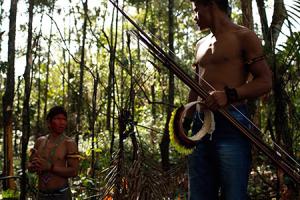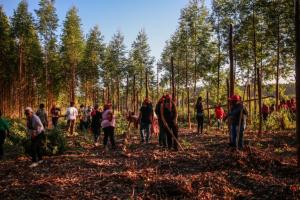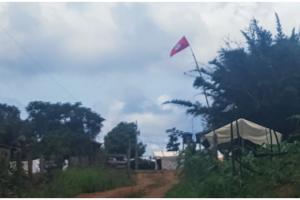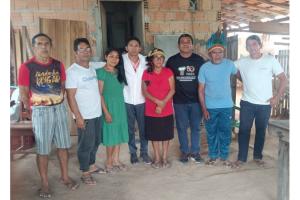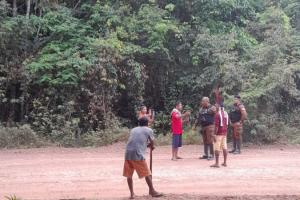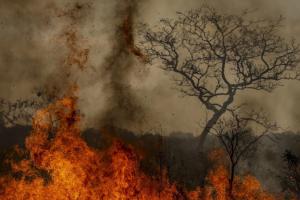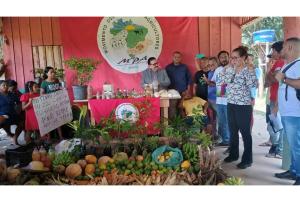We invite you to reflect with an activist who explores resistance processes and the challenges they face, based on her experience with struggles in Brazil. In this reflection, we also invite you to join the collective resistance from your own contexts and spaces of organization. The fight continues and the fight is one!
Brazil
Bulletin articles
24 June 2025
The following excerpts are from conversations we had with people who, despite living on different continents, have made the same choice: to live without electricity. Whether they live in the Indonesian archipelago or the Brazilian Amazon, their testimonies show that electricity is not an essential resource for human life. On the contrary, for these people, it is essential to do without it.
Action alerts
13 May 2025
Wildlife Works company (WWC) wants to carry out a carbon project in the Brazilian Amazon. But the Ka'apor indigenous people in resistance don’t want to turn nature into a commodity. Support this petition for the authorities to ban the company from operating in the Alto Turiaçu Indigenous Land.
Other information
23 April 2025
On the side-lines of the UN climate conference in 2023 in the United Arab Emirates, the government of Brazil introduced the “Tropical Forests Forever Facility” (TFFF). The fund, an idea initially thought up by the World Bank in 2018, is expected to be launched at the 2025 UN climate conference in the Amazon city of in Belem, in Brazil. Private sector and public investments and donations would provide the seed capital for financial managers to speculate on capital markets.
Articles
13 March 2025
WRM expresses its solidarity with the struggle of women from the Rural Landless Workers' Movement (MST) in Brazil. On this day, March 13, they are taking various actions across the country in favor of agrarian reform and against the multiple forms of violence perpetrated against women, under the slogan “Agribusiness means violence and environmental crimes. The struggle of women is against capital”. One of the actions is taking place in the state of Espírito Santo, where 1000 women have occupied an area belonging to Suzano.
Action alerts
28 February 2025
Solicitamos su solidaridad con el Movimiento de los Trabajadores Rurales Sin Tierra (MST), en Brasil, a través del envío urgente de una carta a las autoridades que se indican a continuación para que detengan el desalojo de unas 100 familias de un asentamiento del MST en el estado de Maranhão.
Other information
15 December 2024
Meticulous research conducted by the New Social Cartography of the Amazon Project in conjunction with traditional communities in the upper Acará River area over the course of five years has resulted in the dossier “Indígenas Turiwara Tembé no alto rio Acará: conflitos étnicos e territoriais”. This outstanding work describes in detail the history and resistance struggles of traditional communities in this part of Pará, proving that the Turiwara Tembé belong in the territory they have demanded for many years.
Articles
1 November 2024
In the upper Acará River in Pará, in the Brazilian Amazon, Turiwara indigenous people are defending their territory against the oil palm monoculture company Agropalma, that invaded the lands. The Turiwara fear for their lives due to the presence of company guards and other heavily armed people, frightening them.
Other information
24 October 2024
The Articulação Agro é Fogo, which brings together social movements, organisations and pastoralists who have been working for decades to defend the Amazon, Cerrado and Pantanal and the rights of their peoples and communities, has released an open letter.
Action alerts
5 September 2024
National and international organizations sent an letter to Brazilian authorities to demand urgent protection for the Turiwara indigenous people of the upper Acará River, in Pará, who are suffering violence and serious threats from Agropalma company.
Action alerts
23 August 2024
Since Monday, 22 August, the Turiwara people in the municipality of Tailândia, in the Brazilian Amazon state Pará took back their territory, illegally in the hands of the industrial oil palm company Agropalma.
Bulletin articles
22 August 2024
Peasant families are threatened with eviction by Brasil Bio Fuels (BBF) oil palm plantation company, with the complicity of the state government. This article shows that the much spoken of ‘bioeconomy’ is not ‘sustainable’ and even less ‘clean’. What it does is destroy communities’ territories, just like fossil fuel-based extractive industries have been doing for a long time.
